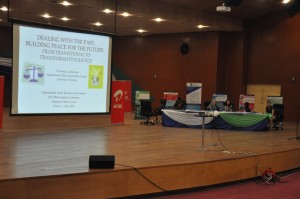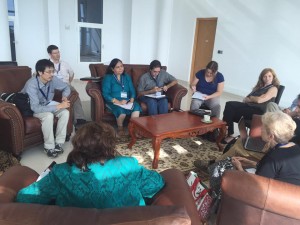The International Peace Research Association has been hosting insightfu l conferences in the pursuit of world peace and security since its inception in 1964 and has recorded massive success and support from global stakeholders of peace building. The 26th IPRA General Conference on “Agenda for Peace and Development” is organised at Freetown by IPRA in collaboration with the University of Sierra Leone as the host institution as and Northumbria University (UK) and Sakarya University (Turkey).
l conferences in the pursuit of world peace and security since its inception in 1964 and has recorded massive success and support from global stakeholders of peace building. The 26th IPRA General Conference on “Agenda for Peace and Development” is organised at Freetown by IPRA in collaboration with the University of Sierra Leone as the host institution as and Northumbria University (UK) and Sakarya University (Turkey).
The increasing ratio of violent conflicts arising within countries rather than between them in the post-cold war era possesses serious threat to global peace and security. This unabated growth of conflicts and wars has created an academic awakening and opened the eyes of scholars and decision makers to deliberate on the means of developing effective short, medium and long term strategies and viable methodologies for preventing and resolving these conflicts and wars and in overcoming the challenges and difficulties that lie ahead.
In this conf erence, I participated in the Nonviolence and Peace Movements Commission presenting a paper on “Curren t challenges for unarmed civilian peacekeeping to prevent violence and promote social change”. This paper aimed to present the main challenges which are currently facing those organizations providing unarmed civilian peacekeeping. Unarmed civilian peacekeeping refers to the use of trained unarmed civilians who use non-violence to prevent violence and promote conflict transformation in situations of violent conflict. This approached has proved its effectiveness around the word to support local efforts to build peace. It is a strategy cheaper than that of military peacekeeping and it may also do less harmful effects on local populations. Nowadays, as a result of that, there are multiple initiatives providing unarmed civilian protection to different target groups.
erence, I participated in the Nonviolence and Peace Movements Commission presenting a paper on “Curren t challenges for unarmed civilian peacekeeping to prevent violence and promote social change”. This paper aimed to present the main challenges which are currently facing those organizations providing unarmed civilian peacekeeping. Unarmed civilian peacekeeping refers to the use of trained unarmed civilians who use non-violence to prevent violence and promote conflict transformation in situations of violent conflict. This approached has proved its effectiveness around the word to support local efforts to build peace. It is a strategy cheaper than that of military peacekeeping and it may also do less harmful effects on local populations. Nowadays, as a result of that, there are multiple initiatives providing unarmed civilian protection to different target groups.
Unarm ed civilian peacekeeping effectiveness differs according to a set of conditions. Conditions include internal and external factors, as well as local and international circumstances. This paper analysed those conditions in order to recognize which ones may reinforce or weaken the capacity of unarmed civilian peacekeeping to prevent violence and contribute to social change. Then, it identified the main challenges threatening the extension of effective unarmed civilian peacekeeping initiatives across the world. Finally, it offered some recommendations for activists and policy makers to overcome those challenges.
ed civilian peacekeeping effectiveness differs according to a set of conditions. Conditions include internal and external factors, as well as local and international circumstances. This paper analysed those conditions in order to recognize which ones may reinforce or weaken the capacity of unarmed civilian peacekeeping to prevent violence and contribute to social change. Then, it identified the main challenges threatening the extension of effective unarmed civilian peacekeeping initiatives across the world. Finally, it offered some recommendations for activists and policy makers to overcome those challenges.
